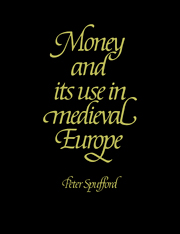Book contents
- Frontmatter
- Contents
- List of maps
- List of tables
- List of graphs
- Acknowledgements
- Introduction
- Part I Before the Commercial Revolution
- Part II The Commercial Revolution of the Thirteenth Century
- Part III The Late Middle Ages
- Conclusion
- Appendix I The Coins Most Commonly in Use in the Middle Ages
- Appendix II Money of Account
- Appendix III Production at Some Later Medieval Mints
- Bibliography
- Coin Index
- General Index
- Frontmatter
- Contents
- List of maps
- List of tables
- List of graphs
- Acknowledgements
- Introduction
- Part I Before the Commercial Revolution
- Part II The Commercial Revolution of the Thirteenth Century
- Part III The Late Middle Ages
- Conclusion
- Appendix I The Coins Most Commonly in Use in the Middle Ages
- Appendix II Money of Account
- Appendix III Production at Some Later Medieval Mints
- Bibliography
- Coin Index
- General Index
Summary
Since historians have generally found the pursuit of happiness hard to analyse and chronicle, they have concentrated rather on the other two principal preoccupations of the human race, the pursuits of power and of wealth. In its widest sense ‘money’ was, in the Middle Ages, not only, with land, the major form of wealth, but also the measure of all other forms of wealth. It is therefore surprising that historians of this period have paid comparatively little attention to money. The availability and use of money have changed so much and so often over time that it must be considered one of the key variables in our understanding of medieval societies, along with population, religion and developing agricultural, industrial and commercial techniques. Change in the availability and the use of money is, for example, one of the keys to explaining the changing fabric of rural society, as well as of urban society, in the Middle Ages. The relevance of money to rural society in the Middle Ages is often ignored, to their cost, by early modern historians, who too readily assume that the rural use of money was a novelty of their own period. Change in the availability and the use of money is also one of the keys to explaining the changing nature of the framework of political activity in the Middle Ages. A knowledge of it greatly clarifies our understanding of a whole gamut of political structures, from the shreds of centralised organisation inherited by the barbarians from Rome, through the most decentralised forms of ‘feudal’ authority, to the earliest examples of the ‘modern bureaucratic state’ in the later Middle Ages.
- Type
- Chapter
- Information
- Money and its Use in Medieval Europe , pp. 1 - 4Publisher: Cambridge University PressPrint publication year: 1988



